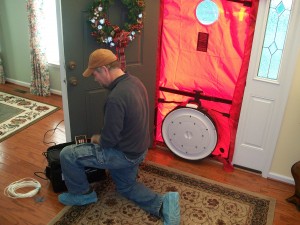 There has been a lot a talk in recent years about conserving energy and building houses that use less. All this has sparked some interest at your house in lowering your energy bills. Conserving energy makes sense, but just where should I start? My house isn’t that old, could it still be an energy hog? How do I assess my house and determine what could be changed to help me save money, and which one of these energy saving tasks should I do first? Do I need the advice of a professional to help me analyze where I am losing money? After all, nobody knows my house better me, right?
There has been a lot a talk in recent years about conserving energy and building houses that use less. All this has sparked some interest at your house in lowering your energy bills. Conserving energy makes sense, but just where should I start? My house isn’t that old, could it still be an energy hog? How do I assess my house and determine what could be changed to help me save money, and which one of these energy saving tasks should I do first? Do I need the advice of a professional to help me analyze where I am losing money? After all, nobody knows my house better me, right?
No one likes to lose money. However, we tend not to do anything about those small leaks or seemingly minor electrical losses because, well, they’re small. But added up, all these minor losses add up to something quite substantial. For example, maybe under your house one of your HVAC lines that were fairly well sealed when it was installed has sprung a tiny leak. Maybe the tape that kept the expensive conditioned air from leaking out into your crawlspace has deteriorated over time, and it just came unstuck. The loss of warm air to your downstairs office is imperceptible to you. However, to your thermostat, every degree of change in your house is noticed. This little leak is forcing your HVAC system to run on just a little longer to reach the same temperature. Not only is this extra run time costing you money, but it is also causing your HVAC to wear out sooner.
Now let’s add to that small leak all the other small leaks in your ductwork. And to that, we will add the air leaks around that door onto your porch, the lack of insulation over your can lights, that area in your attic where the electrician removed some insulation to run some extra wires and never put it back, and that improperly caulked window in the master bath; now things are beginning to add up. Now let’s compound the problem because none of these is a onetime leak; they continue on, only getting worse over time, for 24 hours a day, 365 days a year.
This wouldn’t be so bad if we weren’t talking about the system that is the single largest draw of energy in your house. On average, a house’s HVAC system is responsible for using up to 44% of the total energy used by you. So what do you do? Where do you start? It’s time to call in a professional. This is one home improvement project that you are not going to have the tools to do yourself. You need a Home Energy Audit so all those small leaks can be pinpointed and plugged so they won’t continue to cost you a fortune. The sooner the better. I haven’t done an audit yet where the homeowner’s weren’t amazed and glad that they decided to give us a call. Have you had an audit? I’d love to hear what your thoughts about it, so post your comments here and let’s start a conversation.
